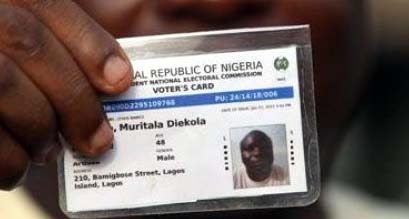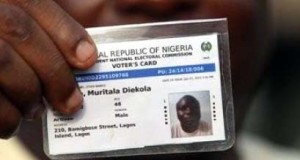PVC: Just Before The Next Exercise Begins By Adewale Kupoluyi
Articles/Opinion, Latest Headlines Friday, August 22nd, 2014
The just-concluded exercise for the issuance of Permanent Voter Cards (PVCs) by the Independent National Electoral Commission (INEC) has been received with mixed feelings throughout the federation. While a few people have applauded the exercise, many participants on the other hand, who had turned out to collect their cards complained that the process was slow, cumbersome and disorganised at the various collection centres. The exercise was designed to provide a window of opportunity for initially-registered voters, whose names have been removed as a result of multiple registration, incomplete biometrics or technical hitches in the course of running the Automated Fingerprint Identification System (AFIS) on data collected during the 2011 voters’ registration. The PVCs were produced to replace the cold-laminated Temporary Voter Cards (TVCs) that were previously issued. According to INEC, the TVCs are not only fragile, they are also susceptible to abuse by unscrupulous persons, who in the past were alleged to have illegally massed-up the cards and use them in manipulating elections but with the new card, which is chip-based, it contains all the biometric data of a legitimate holder. While being used, the PVC will be swiped with the card reader at the polling unit to ensure complete authentication and verification of the voter. It is also expected that by the time the PVCs life span expire in ten years’ time, the National Identity Card system should have come fully on stream and expectedly, the country would not need to incur fresh costs on acquiring separate identity document for voters.
 The Phase II of the distribution of the PVCs has just been concluded in 11 states, namely: Bauchi and Yobe, (North-east); Jigawa and Sokoto (North-west); FCT and Kwara (North-central); Ebonyi and Anambra (South-east); Delta and Cross River (South-south) and Ondo and Oyo (South-west) while the Continuous Voters’ Registration (CVR) exercise is expected to follow immediately. The observed lapses in the second phase include inadequate public awareness, missing names, insufficient time to the complete the exercise, ill-preparedness of some the officials and inadequate supply of PVCs. In some centres, large volumes of the cards were stacked in front of officials with few people to collect them while in others, the situation was completely different as confusion, disorderliness and outright disenfranchisement prevailed. In view of the past experiences of INEC and the importance of the forthcoming elections, there is need to tighten the loose ends that could likely cut-off many eligible voters from exercising their civic duties since only the possession of valid PVCs could guarantee voting. Therefore, any lapse, foot-dragging and shortcomings that could make the cards unavailable to the people and could summarily be misconstrued as a deliberate ploy by the government to disenfranchise them and manipulate the electoral process. This perception is not healthy for our polity. Despite the rough start in 2012, when the Chairman of INEC, Professor Attahiru Jega, had first told the nation that his commission would commence the issuance of the PVCs a year later, but this was not to be and at the beginning of 2013, Jega announced again that the PVCs would be ready by the end of the same year, assuring that it had learnt a ‘bitter lesson’ from the 2011 elections. Therefore, there is an urgent need for INEC to prove to the people that it has truly learnt from its limitations. For instance, under the Phase I exercise, which was to hold in 10 states of Kogi, Abia, Enugu, Taraba, Gombe, Zamfara, Kebbi, Benue, Akwa Ibom and Bayelsa states, reports have it that INEC cancelled the distribution of PVCs in 205 polling units across Akwa Ibom State by the stoppage of the exercise across 24 local council areas, which could only take place only in 2,779 out of 2,982 polling units in the state, while blaming the development on multiple registrations or wrong capture of bio-data by voters.
The Phase II of the distribution of the PVCs has just been concluded in 11 states, namely: Bauchi and Yobe, (North-east); Jigawa and Sokoto (North-west); FCT and Kwara (North-central); Ebonyi and Anambra (South-east); Delta and Cross River (South-south) and Ondo and Oyo (South-west) while the Continuous Voters’ Registration (CVR) exercise is expected to follow immediately. The observed lapses in the second phase include inadequate public awareness, missing names, insufficient time to the complete the exercise, ill-preparedness of some the officials and inadequate supply of PVCs. In some centres, large volumes of the cards were stacked in front of officials with few people to collect them while in others, the situation was completely different as confusion, disorderliness and outright disenfranchisement prevailed. In view of the past experiences of INEC and the importance of the forthcoming elections, there is need to tighten the loose ends that could likely cut-off many eligible voters from exercising their civic duties since only the possession of valid PVCs could guarantee voting. Therefore, any lapse, foot-dragging and shortcomings that could make the cards unavailable to the people and could summarily be misconstrued as a deliberate ploy by the government to disenfranchise them and manipulate the electoral process. This perception is not healthy for our polity. Despite the rough start in 2012, when the Chairman of INEC, Professor Attahiru Jega, had first told the nation that his commission would commence the issuance of the PVCs a year later, but this was not to be and at the beginning of 2013, Jega announced again that the PVCs would be ready by the end of the same year, assuring that it had learnt a ‘bitter lesson’ from the 2011 elections. Therefore, there is an urgent need for INEC to prove to the people that it has truly learnt from its limitations. For instance, under the Phase I exercise, which was to hold in 10 states of Kogi, Abia, Enugu, Taraba, Gombe, Zamfara, Kebbi, Benue, Akwa Ibom and Bayelsa states, reports have it that INEC cancelled the distribution of PVCs in 205 polling units across Akwa Ibom State by the stoppage of the exercise across 24 local council areas, which could only take place only in 2,779 out of 2,982 polling units in the state, while blaming the development on multiple registrations or wrong capture of bio-data by voters.
In Oyo State, only 824,922 PVCs were distributed out of the 1,630,332 PVCs brought to the state from the expected 2,002,866, with a shortfall of 349,539, spreading across eight out of the 33 local councils in the state. Similarly, the Conference of Nigerian Political Parties (CNPP) in Kwara State had alleged that in Ilorin East LG of Afeyin 007 Unit, only 29 PVCs were available out of 500 PVCs required; Ayetoro 023, only 128 PVCs were available out 401 PVCs while in Alalubosa Unit 021, only 359 PVCs were available out of the 600 PVCs. The CNPP claimed further that Ilorin West LG did not appear on the list of affected LG as announced by INEC while the list of polling units where voters were said to have been unable to obtain their PVCs include: Ago Olowo 1, Ago Olowo 025, Ago Olowo 2, Ago Olowo 032, Ojibara 1&2, Ode Fara 023, Ode Sefura, Ode Afase, Baboko, Oko Erin II, Wara Osin I, Ode Olowomesan, Ode Eleshinla 033, Ode-karebu, Zarumi-Ojuekun and Ode Asileke 020, among others. As INEC prepares for Phase III, it should as a matter of importance, lower the stringent conditions imposed on both registered voters and unregistered eligible voters. For instance, asking those that had lost their cards to obtain ‘police extract or court affidavit’ or both could be very frustrating and capable of discouraging them from obtaining the cards. Restricting the CVR exercise to electoral wards or collation centers could also deny many unregistered eligible voters the opportunity of being captured. INEC should create more centers across the country. It should also improve on its Pen-on-Paper (POP) data management to reduce to the barest minimum, incidents of missing names that has become a recurring decimal and more importantly, there should be adequate publicity to elicit massive participation in the subsequent ones and to let the people know that the PVCs could still be obtained at INEC offices in the local councils, if they had missed the last exercise.
No doubt, INEC’s performance has been encouraging under Jega, considering the various strategies put in place at improving the electoral process unlike what it used to be in the past. However, the successful conduct of the general elections is not going to be a tea party. It will require the commitment, planning, professionalism, honesty and the political-will to carry out this sacred national assignment. We should not shy away from admitting that this enormous work does not rely on INEC alone. We should urgently assist the commission in the discharge of its constitutional duties while the government should put the appropriate legal and administrative structures in place. The operational independence of the commission should be strengthened, persons convicted of electoral offences should be disqualified from contesting elections and holding any positions, voting by Nigerians in Diaspora should become a reality, establishment of an Electoral Offences Commission with power to investigate and prosecute all types of electoral offences, the role of the military in securing the distribution and delivery of electoral materials should be well moderated while the emerging trend in deploying masked security operatives, as experienced in the last Osun State gubernatorial poll should be stopped without further delay. These are some of the major challenges that deserve serious attention before 2015.
Kupoluyi writes from the Federal University of Agriculture, Abeokuta, vide, adewalekupoluyi@yahoo.co.uk, Twitter, @AdewaleKupoluyi
Related Posts
Short URL: https://www.africanexaminer.com/?p=16584






















